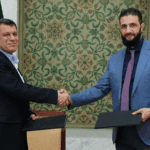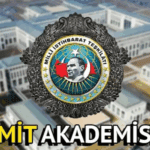In the final phase of Erdoğan’s two-decade rule, a quieter, more calculating force has begun defining the regime’s future: İbrahim Kalın, Turkey’s intelligence chief, presidential confidant, and now de facto architect of what comes after Erdoğan. Though he rarely occupies headlines, Kalın is shaping the post-Erdoğan state through two powerful—but distinct—operations: the divide-and-co-opt campaign targeting the Gülen movement, and the second Kurdish peace process, both running in parallel but driven by separate logic and objectives.
On one front, Kalın is executing a highly coordinated psychological operation aimed at neutralizing the Gülen movement, particularly abroad. Rather than continuing the mass purges and detentions that followed the 2016 coup attempt, Kalın has shifted tactics: instead of silencing all dissent, he is amplifying select voices from within the movement’s former ‘elite’—especially academics who were once colleagues and co-thinkers. As detailed by our exposé, “Erdoğan’s Divide-and-Coopt Strategy,” this new phase of repression is subtler but far more corrosive. It is designed not to crush the movement through force but to hollow it out from within, using insiders’ voices to delegitimize its past and fracture its present.
This campaign gained momentum when former Gülen-affiliated academics like İhsan Yılmaz, Ahmet T. Kuru, Özgür Koca, and Gökhan Bacık—all of whom had academic trajectories remarkably similar to that of İbrahim Kalın himself—began publicly distancing themselves from the movement. Like Kalın, these scholars were trained in political science, Islamic thought, and secularism-religion relations in the modern Muslim world. They often worked within the Western academy while also engaging in debates about Turkish identity, Islamism, and democratization. Their intellectual worlds overlapped not only in subject matter but in institutional paths, with many of them holding posts at Turkish universities before moving abroad during or after the purges.
These similarities were not just academic; they created personal and professional bonds. Several of them were frequent contributors to Today’s Zaman, the now-shuttered English-language daily once affiliated with the Gülen movement, where Kalın also used to publish articles. In that journalistic space—framed as a liberal and intellectual platform in the early 2000s—Kalın and these academics shared ideological premises, discussed Islamic pluralism, democratization, and Turkey’s place in the Muslim world. Though they later diverged politically, these shared origins helped create a durable network of academic familiarity and trust, which Kalın has now found useful to manipulate from his current position of power.
The online platform of these former Gülenists academics, kitalararasi.com, launched after the staged coup attempt, initially presented itself as a forum for open, critical Islamic thought. However, over time, it evolved into a space where soft critiques of the Gülen movement were voiced—often in the language of self-reflection or “post-Islamist” rethinking. Kalın, with his deep understanding of both the individuals and the discourse, recognized the potential of such critiques to be strategically weaponized. He didn’t need to coerce them—he merely needed to allow their intellectual disillusionment to serve his broader goals.
These critiques—couched in academic respectability, coming from former insiders, and wrapped in moral urgency—have been far more effective in damaging the movement’s cohesion than any government decree or televised attack. Kalın understands this intimately. As a former academic who once wrote about Islamic philosophy and civilizational dialogue, he knows the currency that such critiques carry within the movement. What makes this operation so powerful is not that it is crude, but that it is familiar, persuasive, and difficult to dismiss from within the movement itself. In this way, Kalın is exploiting not just political fault lines—but the very intellectual infrastructure that once bound them together.
Kalın’s genius lies not only in co-opting these critiques, but in knowing how to deploy them without appearing involved. He doesn’t need to give these figures talking points; their disillusionment alone is enough. When Gökhan Bacık published his highly controversial proposal for the Gülen movement to “dissolve itself”—drawing a disturbing parallel to the PKK’s disarmament process—it was immediately picked up by pro-government media as proof that even the movement’s own intellectuals had given up. Mümtaz’er Türköne’s endorsement of Bacık’s proposal sealed the message. Suddenly, a voluntary disbandment—long desired by Ankara—was being floated not by government figures, but by ex-insiders.
Another figure, Ahmet Dönmez, has complicated the picture further. A former journalist for Zaman, Dönmez was nearly killed in a brutal attack in Stockholm in 2022. Though initial suspicion fell on Turkish operatives or allied criminal networks, regime-friendly media quickly spun a counter-narrative: that he was attacked by fellow Gülenists in a fit of internal feuding. Since he departed from Turkey a decade ago, Dönmez’s rhetoric has undergone a significant change, increasingly resembling state talking points. He has accused exiled leaders of incompetence, highlighted internal dysfunction, and framed the movement’s decline as self-inflicted. Whether Dönmez has been coerced, compromised, or simply disillusioned, the outcome serves Kalın’s goals perfectly: to erode trust, deepen confusion, and dissolve coherence within the movement.
One of the most revealing operations of this strategy was the recently exposed Operation Ricerca. Disguised as academic outreach, Ricerca lured exiled Turkish scholars—many of them Gülen-affiliated—into what appeared to be legitimate research interviews regarding the movement itself. In reality, it was a MİT-run intelligence trap, harvesting data and sowing paranoia. Once Ricerca was exposed, it didn’t just cause embarrassment—it shattered trust within the Gülenist exiled academia. Suspicion metastasized. That, too, was the point.
All of this is done with Erdoğan’s full approval, as it serves his interest in keeping the Gülen issue contained under his control. He aims to use the movement once again to further his political goals both within the country, including in the bureaucracy, and abroad as a means of projecting Turkey’s soft power.. But it is Kalın’s long-term project, rooted in his own history and intellectual profile. Unlike Erdoğan, who used the movement and then crushed it, Kalın is repurposing its fragments—transforming former friends into functional critics, then folding them into his broader strategy for power consolidation in the post-Erdogan era.
Kalın’s ambitions reach beyond the Gülenists. While this psychological operation is in progress, he is also a key figure in a separate initiative: the second Kurdish peace process. This process was initiated and encouraged by Washington and later received a strong endorsement from Devlet Bahçeli. It also gained support from Erdoğan and other political actors both in Turkey and abroad. This renewed dialogue with Kurdish representatives highlights Kalın’s intellectual influence and reflects his extensive academic involvement with Islamic political thought, Ottoman pluralism, and strategic statecraft.
Unlike the Gülen operation—which relies on co-opted former insiders—the Kurdish process is entirely Kalın’s own creation. It is not outsourced, not dependent on intellectual allies. It is the product of his reading of geopolitics: that Turkey, after years of nationalist overreach, must reestablish control over the Kurdish space—not through military suppression alone, but through managed reconciliation, calibrated ambiguity, and careful narrative engineering. Bahçeli’s involvement offers nationalist cover. American tolerance offers international legitimacy. Kalın himself offers strategic continuity.
These two tracks—the fragmentation of the Gülen movement and the recalibration of Kurdish dialogue—are separate but symbiotic. Together, they form the two pillars of Kalın’s post-Erdoğan project: eliminate ‘threats’ from the past while engineering new arrangements for the future. In both cases, Kalın’s approach is to maintain control over what appears to be transformation. But behind the curtain, he is orchestrating every move by turning the Gulenists against each other and making the Kurds believe they were heard.
This is not a transition. It is managed succession. Kalın does not want a new Turkey. He wants Erdoğan’s Turkey—with updated optics, tighter control, and softer rhetoric. He wants to rule not by populist charisma, but by elite calibration. And he’s using every tool at his disposal: former friends, old texts, disillusioned critics, and proxy narratives. What looks like collapse is, in fact, construction.
Erdoğan has established his one-man rule by dismantling the Gülenist movement and suppressing the Kurds. Kalın is now trying to build and consolidate his power in the post-Erdoğan era by reprogramming both groups. If the opposition, which includes both Gülenists and Kurds, fails to recognize the dual nature of this trap, they risk being integrated into the very regime they hoped to outlast.
By: News About Turkey (NAT)



